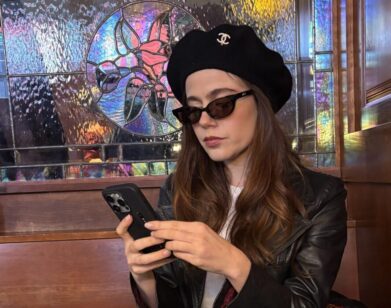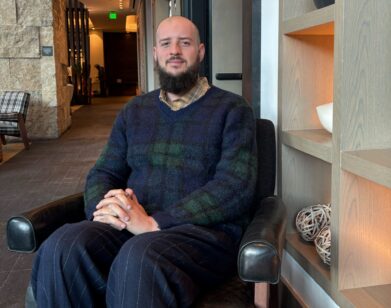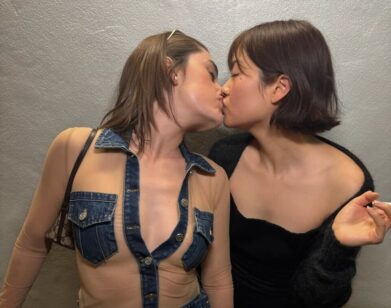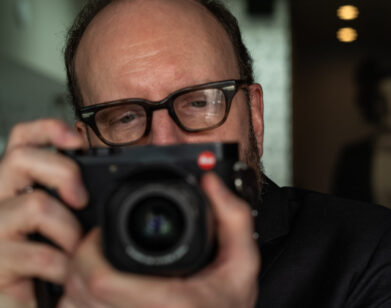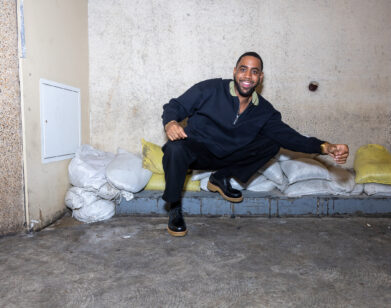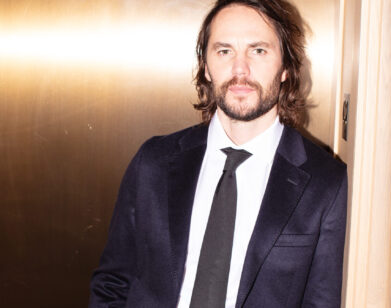Daniel Espinosa and Life Beyond Earth
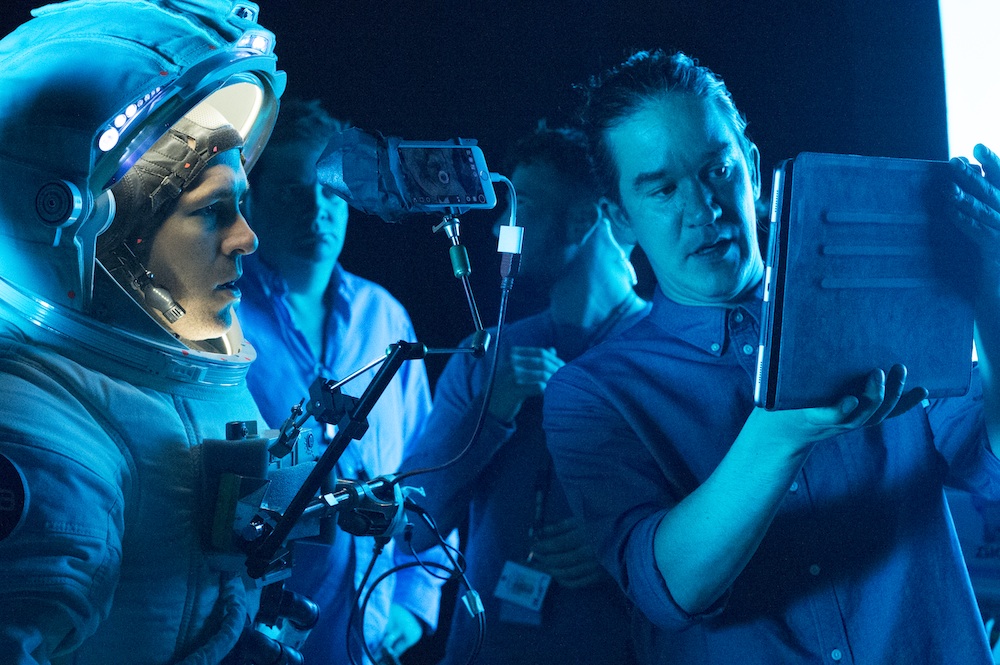
ABOVE: RYAN REYNOLDS (LEFT) AND DANIEL ESPINOSA ON THE SET OF LIFE. PHOTO COURTESY OF SONY PICTURES.
When six astronauts living in an international space station receive samples from Mars, they make an unprecedented discovery: a living single-cell organism. School children back on Earth name the new being Calvin, and the astronauts proudly pronounce it “the key to life.” It quickly becomes apparent, however, that Calvin is more nefarious than its human name suggests.
Starring Rebecca Ferguson, Jake Gyllenhaal, Ryan Reynolds, Hiroyuki Sanada, Olga Dihovichnaya, and Ariyon Bakare, Life is the sixth feature film from Swedish-Chilean director Daniel Espinosa, and Espinosa’s first venture into the realm of science-fiction. “I come from a realistic film tradition,” Espinosa says. “I started in Denmark where people like Lars von Trier and Thomas Vinterberg were my teachers,” he continues. “[With Life], I was struck that it was going on right now, today. I thought that made it different. It made it not about fictional people in the future, but about us.”
EMMA BROWN: How did you first come across the script for Life?
DANIEL ESPINOSA: It was sent to me through the very usual channels. It came in with a sort of skepticism from my reps; it was sent out primarily to first-time directors, so in the Hollywood system, it was regarded as a lower priority. But it was still sent over, so I thought it had to have something. I started reading it and I simply couldn’t put it down. It had such tremendous pace; it had some good beginnings of character. It was something as unusual as a science fiction movie that had all of these genre-esque traditions—in a very superficial way, you could call it an Alien rip-off—[but] it was placed in a realistic world, in our world.
BROWN: I wonder why they mainly sent it to first-time directors. It doesn’t seem like a particularly easy film to make.
ESPINOSA: I completely agree. Also the budget back then was lower, so I have no idea how they thought they could make it happen. I think that because of the genre, people thought directors who have done a bit more work wouldn’t do it. I just saw this incredible possibility to go into the sci-fi world with something that I believe is different and that has these qualities of realism. It has two really great surprises—one towards the end and one when the first character dies. I thought that was interesting. And the creature itself felt intelligent and sentient.
BROWN: When you get sent a script and decide you want to direct it, is a matter of just saying yes? Or do you have to pitch your vision for the film?
ESPINOSA: Sometimes you can just say yes, but I always suggest not doing that. What’s important is that you and the producers are on the same page. One should always go in and really be quite frank with the producers about what you want to do, because if you don’t get on the same page in the beginning, you will not be on the same page at the end. All of these horror Hollywood stories about directors getting crushed, they come from that misunderstanding.
BROWN: Who is the first person you hire when you take on a new project?
ESPINOSA: The first person I hired on this one was my composer. That’s almost always the case. Me and my composer have been working together for years—since we were 19 years old. This was a bit of a childhood dream for both of us, to do sci-fi, but also to do a sci-fi score.
BROWN: When you are thinking about the film you want to make, is it more difficult to envision it when you know there could be a lot of green screen or special effects?
ESPINOSA: I decided not to do any green screen at all. I don’t do commercials and I don’t do TV, so my experience is quite limited to realistic features. I could easily see the images in my head, but I couldn’t picture myself directing it in this green screen world, so I decided to build all of the sets—build the entire ship—in a studio. That was a bit of a boy dream, to build a spaceship. [laughs]
BROWN: What did you do with the ship after shooting?
ESPINOSA: That’s the horrible part; they just pull it down and destroy it. It’s like when you’re a kid and somebody destroys your toy that you have wished to get for so many years. That’s how it felt. It was a very sentimental moment when the trucks came and they just trashed this beautiful piece of architecture.
BROWN: What about those intense moments with Calvin? You said that you built the spaceship, but the visuals of Calvin weren’t added until post-production—were those scenes particularly difficult to get right?
ESPINOSA: I get that question a lot, but a fundamental piece of performance and acting when you have classically trained actors is visualization. If you go to watch Shakespeare, when they are talking to the ghost, the ghost is not there. So I think it’s almost more handy to have people envision their darkest fears than to show a representation of it. I found—and this was a bit of a surprise to me—the performances got better if they had nothing to look at than if I put something up there.
BROWN: How did you decide what Calvin would look like?
ESPINOSA: I decided to not go into the design process in the same way that you usually do, because I think that most creatures tend to look the same. I went in a scientific way instead. I hired a brilliant geneticist, and, the same way they build up the dinosaurs by just having one bone, I had him go through that reverse process. If you have a one-cell being that has these kind of traits and is capable of doing these kind of things, as we see in the script, and is raised and created in zero gravity, which assumptions would you make of how it would look? This geneticist specializes in the creation of life on Earth, so it was quite fun, quite enlightening. Did you know, for example, that all life forms are tubes?
BROWN: I definitely did not know that. Do you have any desire to go into space personally?
ESPINOSA: No desire at all. Absolutely not. Not a chance in hell. I hesitate to even go into forests. I really like to have a coffee shop next door and be able to smoke a cigarette. I’m a city person; I regard nature as something hostile and problematic. I do enjoy it when I get out there, but it is mostly against my will. It’s a bit of an awkward thing to say—people really don’t like it when you say that.
BROWN: I know that you’ve worked with Ryan Reynolds before. Had you worked with anyone else from the Life cast before?
ESPINOSA: No. I knew Rebecca [Ferguson] from afar. Sweden has a film industry as big as a small village in Wisconsin, so you tend to run into each other, but we’d never worked together before. She came to a casting I held when she was 19, I think, when I was doing my first feature. The reason I didn’t cast her was that she was too beautiful, and I wanted a gritty young girl. But she was an excellent actor back then. Then Jake [Gyllenhaal] and me had been in discussions about different pictures that never came to conclusion. In many ways, it was a cast of people that I’ve been dreaming of working with.
BROWN: They say you make a film several times: when you shoot it, when you edit it. Which stage is the most challenging in your opinion?
ESPINOSA: Editing. In editing, you really face what the movie is. When you shoot it, you have this illusion that you’re making the masterpieces that you’re inspired by. But when you finally edit the movie, the movie is just a movie, so there is always a hint of disappointment, particularly when you see your first cut. I spoke to Martin Scorsese and I said, “How do you deal with it—your first cut?” And he said, “There’s nothing to deal with. You just cry.” So I thought, “Okay. Let’s just cry then.”
BROWN: When did you decide that you wanted to make films?
ESPINOSA: Quite late, I was 18 years old. I didn’t have any money; I didn’t have any support from my family in that way. My family never made a big chunk of change and I had a fight with my father at the time, so I was practically living nowhere. I thought to myself, “If I’m living nowhere and just eating what I can get, I might as well take a job that’s something that I would love.” I didn’t know how to get in [to filmmaking], so I walked up to a production office and I said, “Why don’t you just let me make coffee for you guys? You don’t have to pay me, but I promise I’ll be better than anyone in there.” Most kids that were there were upper-middle class kids, and they were not ready to really fight for their jobs, but I was. That’s how it started.
BROWN: Did you grow up watching a lot of movies?
ESPINOSA: Yes. My parents got divorced when I was quite young, [and it was] my way to get close to my father, who I was missing a lot. When I met my father after the divorce, we didn’t have much to talk about. He was a very hard man, a former political refugee who had been tortured for many years. He didn’t know quite what to say, and I didn’t know what to do, because I was a very young kid. Then he said, “Why don’t we go to the video store and you can rent whatever you want?” So we rented four movies, and then we did that for years to come, and that became our friendship. He would tell me about the movies he enjoyed and explain to me why they were good. I think my father wanted to be a filmmaker, but he got stuck in the military coup in Chile.
BROWN: With Pinochet?
ESPINOSA: Yeah, with Pinochet.
BROWN: When did you find out about your father’s background in Chile? Did he tell you from the very beginning, or was it something that you learnt about when you were older?
ESPINOSA: I think I learnt about it when I was older, but it was part of our whole world. All the families that we would meet were also refugees. We lived in an environment where it would be Iranian refugees, Turkish refugees, Kurdish refugees, people from Yugoslavia. All the kids who hung out had parents that had done something. Some kids had arrived from crossing Europe just a year ago, so they had memories of getting into trucks or hustling themselves through different borders.
BROWN: Have you been to Chile?
ESPINOSA: Yeah. We went. It was not very pleasurable. My father got threatened even though democracy had come back. The military don’t like him. It’s not an issue at all for me to go there, it just became a bit tainted, those memories. But we still have family there. Almost all refugees say this: “I’m planning a trip next year.” They say that every year.
LIFE IS OUT NOW.

